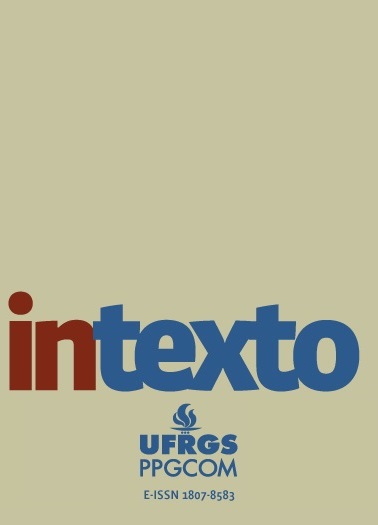“Our” daily Amazon in Brazilian television journalism
DOI:
https://doi.org/10.19132/1807-8583202152.91822Keywords:
Amazon. Journalism. Television. Discourse. Region.Abstract
This paper examines mainstream Brazilian journalistic constructs of the Amazon rainforest region in Brazil, considered as a geographic and especially as a political space situated in the Brazilian territory. Using Michel Foucault’s notion of “discursive events”, we seek ways to analyze television image and sound, as such an analysis would show us how that “region” is enunciated and how it’s assigned different meanings. We are interested in observing in which kinds of discourse and in which contexts it is cut and its cuts are selected to be broadcast on Brazilian national television from the Southeast of Brazil, center of television journalism production in the country.. The corpus of analysis consists of special series of news reports from Rede Globo TV journalism, from 2006 to 2016. Through the concept of polynarrative, we observe how moving image, text and sound are combined in these reports to represent the Amazon rainforest region as a kind of national property, and how it is framed into discussion as a matter of national sovereignty. Throughout the reports, the region is characterized as an object of the coloniality of national discourse, which favors a certain look towards the country’s periphery, as a land both exotic and failed, a land that must be seized, materially and symbolically, by the political, economic and cultural center of the nation, depicted as fit to “support” it in its fragilities.
Downloads
References
AMARAL FILHO, Otacílio. Marca Amazônia: o marketing da floresta. Curitiba: CRV, 2016.
ANDERSON, Benedict. Comunidades imaginadas: reflexões sobre a origem e a difusão do nacionalismo. São Paulo: Companhia das Letras, 2008.
BARBOSA, Marialva. Percursos do olhar: comunicação, narrativa e memória. Niterói: EDUFF, 2007.
BARTHES, Roland. O óbvio e o obtuso: ensaios críticos III. Rio de Janeiro: Nova Fronteira, 1990.
BARTHES, Roland. A câmara clara: nota sobre a fotografia. Rio de Janeiro: Nova Fronteira, 1984.
BECKER, Bertha K. Amazônia. 6. ed. São Paulo: Ática, 1998. 112p. (Série Princípios).
BENETTI, Márcia. Análise do discurso em jornalismo: estudo de vozes e sentidos. In: LAGO, Cláudia; BENETTI, Márcia (org.). Metodologia de pesquisa em jornalismo. 2. ed. Petrópolis: Vozes, 2008. 286p. parte II, cap. 1, p. 107-122.
CAMPBELL, Richard. 60 minutes and the news: a mythology for middle America. Urbana: University. of Illinois Press, 1991. (Illinois Studies in Comunications).
CARDOSO, Fernando Henrique; MULLER, Geraldo. Amazônia: expansão do capitalismo.
ed. Rio de Janeiro: Centro Edelstein de Pesquisas Sociais, 2008.
CASTRO-GÓMEZ, Santiago. Ciências sociais, violência epistêmica e o problema da "invenção do outro". In: LANDER, Edgardo (org). A colonialidade do saber eurocentrismo e ciências socias: perspectivas latino-americanas. Buenos Aires, CLACSO, 2005)
CERTEAU, Michel de. A escrita da história. 2. ed. Rio de Janeiro: Forense Universitária, 2010.
CORRÊA, Roberto Lobato. Região e organização espacial. 7. ed. São Paulo: Ática, 2003.
COSTA, Vânia Maria Torres; COSTA, Alda; AMORIM, Célia. A televisão e a polinarrativa do jornalismo audiovisual. In: SOSTER, Demétrio de Azeredo; PICCININ, Fabiana Quatrin (org.). Narrativas midiáticas contemporâneas: perspectivas epistemológicas. Santa Cruz do Sul: Catarse: 2017. p. 264-277.
COSTA, Vânia Maria Torres. Quando a imagem fala e o texto grita: reflexões sobre modos de narrar no jornalismo televisivo. Cultura midiática, João Pessoa, v. 8, n. 2, jul./dez 2015
FOUCAULT, Michel. A arqueologia do saber. 8. ed. Rio de Janeiro: Forense Universitária, 2012.
FOUCAULT, Michel . A ordem do discurso. 13. ed. São Paulo: Loyola, 2006.
JOLY, Martine. Introdução à análise da imagem. 4. ed. Campinas: Papirus, 2001.
JORNAL NACIONAL. Caravana JN. Rio de Janeiro, Editora Globo, 2007. DVD duplo.
MACHADO, Arlindo. A televisão levada a sério. São Paulo: Senac São Paulo, 2000.
ORLANDI, Eni Pulcinelli. Vão surgindo sentidos. In: ORLANDI, Eni Pulcinelli (org.). Discurso fundador: a formação do país e a construção da identidade nacional. Campinas: Pontes, 1993. 171p. p. 11-25.
QUIJANO, Aníbal. Dom Quixote e os moinhos de vento na América Latina. Estudos Avançados, São Paulo, v. 19, n. 55, set./dez. 2005.
RIBEIRO, Nelson de Figueiredo. A questão geopolítica da Amazônia: da soberania difusa à soberania restrita. Brasília: Senado Federal, 2005.
ROSE, Diana. Análise de imagens em movimento. In: BAUER, Martin W.; GASKELL, George. Pesquisa qualitativa com texto, imagem e som: um manual prático. 7.ed. Petróplis, RJ: Vozes, 2008. p. 343-389.
SOUZA, Márcio. Breve história da Amazônia: a incrível história de uma região ameaçada conta com o apaixonado conhecimento de causa de um nativo. 2. ed. Rio de Janeiro: Agir, 2001.
SOUZA, Márcio. A literatura na Amazônia: as letras na pátria dos mitos. Poligramas, Cali, n. 29, p. 9-26, jun. 2008.
THOMPSON, John B. A mídia e a modernidade: uma teoria social da mídia. 4. ed. Petrópolis: Vozes, 2002.
VELHO, Otávio Guilherme. Capitalismo autoritário e campesinato: um estudo comparativo a partir da fronteira em movimento. 2.ed. Rio de Janeiro: Centro Edelstein de Pesquisas Sociais, 2009.
Downloads
Published
How to Cite
Issue
Section
License
Copyright (c) 2021 Vânia Maria Torres Costa

This work is licensed under a Creative Commons Attribution-NonCommercial 4.0 International License.
The copyright of works published in this journal belong to the authors, and the right of first publication is conceded to the journal. Due to the journal being of open access, the articles are of free use in research, educational and non-commercial activities.
Therefore, the journal uses the License Creative Commons Attribution (CC BY-NC 4.0), which allows sharing of work with acknowledgment of authorship.
Self-archiving (repository policy): authors are allowed to deposit all versions of their work in institutional or thematic repositories without embargo. It is requested, whenever possible, that the full bibliographic reference of the version published in Intexto (including the DOI link) be added to the archived text.
Intexto does not charge any article processing fees (article processing charge).















